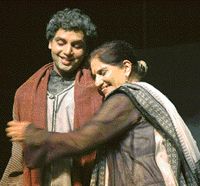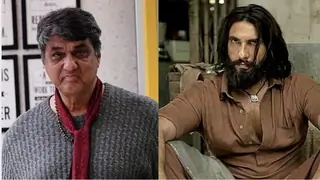KAIFI'S DEMISE
A Major Poet of Progressive Tradition Departs Naresh Nadeem
HE grandpa in Saeed Mirza production Naseem dies on the very day the Babri Masjid is demolished in Ayodhya --- an event which the film describes as "the end of an era." In a somewhat similar way, it was virtually the end of an era when veteran Urdu poet Kaifi Azmi --- who played the grandpa in the film --- died on May 10, 2002.
In fact, with perhaps the sole exception of Mueen Ahsan Jazbi, who is currently bed-ridden in Aligarh, Kaifi Sahib was the last major pillar of progressive literary movement in Urdu that started around 1930 and took a concrete organisational shape in form of the Progressive Writers Association (PWA) in 1936. Coming as it did soon after the departure of Majrooh Sultanpuri and Ali Sardar Jaffri, Kaifi Azmi's demise is a big shock to the people who cherish progressive and democratic values --- not only among the Urdu-speakers but all over the country and abroad.
ARDUOUS JOURNEY
Born on January 19, 1919, in village Mazwan in Azamgarh district of Uttar Pradesh, Kaifi rose to become one of the towering literary figures in Urdu. But he achieved this status only after a long and arduous journey --- from a deeply religious-minded, tradition-oriented young boy to one who believed and said that only socialism could offer mankind a future free from exploitation, oppression, miseries and squalor.
Kaifi was born in a Shia landlord family, as Athar Hussain Rizvi. Like his senior Ali Sardar Jaffri who was also born in a Shia landlord family in Balrampur, he saw the cruel oppression of Hindu as well as Muslim peasants, artisans and menial castes from close quarters. It was this first-hand experience that made him a bitter enemy of the hated zamindari system, of all that it supported and of all that supported it.
Unlike his elder brothers who were sent to Aligarh Muslim University to get western education, a very different life was visualised for young Athar Hussain. His parents and uncles wanted to have a maulvi in the family and so they sent him to Sultanul-Madaaris, a Lucknow-based religious seminary that used to produce Shia clerics. However, as the twist of the circumstances would have it, instead of getting groomed into a maulvi, the young boy turned into a staunch opponent of religious bigotry and fanaticism. In the words of storywriter Ayesha Siddiqui, Kaifi Azmi was sent to Sultanul-Madaaris to learn how to recite fatiha but, instead, he read fatiha on religion itself and quit the seminary.
Apart from the working of the zamindari system that he had seen in his village, one of the earliest influences on young Athar's mind was the celebrated short story collection, Angaray, that came out in 1933 and included short stories penned by Sajjad Zaheer, Mehmood-uz-Zafar, his wife Rasheed Jahan and Ahmed Ali. As any student of the history of Urdu literature would tell you, these short stories shook the traditional Muslim society in India to its core. Transgressing all accepted norms of the so-called civilised behaviour, these stories evoked strongest possible reactions all over the country. While some of the established writers like Premchand welcomed the publication of Angaray, albeit in a guarded language, there were a number of people who condemned it. The British government immediately moved into action and proscribed the book. On the other hand, a section of the clergy issued a sort of fatwa (religious edict) against the book, asking the Muslims not to purchase or read it or keep its copies in their houses.
But the funny part of the story was that there were a large number of people who publicly fulminated against the book but read it with relish, in private. The same situation obtained in Sultanul-Madaaris, too, where all the teachers (maulvis) used to shut themselves in a room during the lunch recess, read the stories included in the collection and laugh over its passages in a subdued voice. This, naturally, aroused the curiosity of most of the students who did whatever they could to find out what went on behind the closed door. And they included young Athar Hussain Rizvi who procured a copy of Angaray and read it word by word, despite the unofficial prohibition imposed in the seminary. This was what changed his whole outlook towards life --- the same process which some of our celebrated short story writers like Ismat Chaghtai, Sa'adat Hasan Manto and Rajinder Singh Bedi also went through.
BEGINNING OF LITERARY LIFE
Soon the young boy began to send his poems to a Lucknow-based progressive journal, but without mentioning his name. The journal's editor as well as readers liked his pieces, but everybody was also dead curious to know who this chap could be. Though the boy had started composing poetry at the tender age of 11, the intervening 8 or 9 years had definitely given a sharp edge to his thinking. Yet it was a kind of fear that compelled him to remain incognito, though it was not the fear of his traditional-minded parents or teachers. The fact was the boy was not himself sure whether his poetry would meet the standards set by his predecessors in the field.
Fortunately for us, Kaifi was soon spotted by Ali Sardar Jaffri who was one of the important figures of the progressive writers' movement in Urdu and was then living in Lucknow. It was Sardar who introduced him to Sajjad Zaheer and other towering figures of the PWA. After that, Kaifi did not take long to bid adieu to Sultanul-Madaaris in the wake of the Quit India movement and then reached Bombay after the Communist Party opened its office there. Here, from 1943, he began to work in the party journals Qaumi Jung and Mazdoor Mohulla, and lived in the party commune. In 1947, he met Shaukat at Hyderabad when he went there for a mushaira (poets' gathering) and soon they were married. This marriage symbolised a unity of purpose as Shaukat was not only an enlightened girl, a rarity in those days, but was also active in the theatre movement. Naturally, she proved a real companion to Kaifi who had been active in the Indian People's Theatre Association (IPTA) which Balraj Sahni, A K Hangal and others had founded in the meantime.
Ever since he joined the Communist Party, Kaifi kept his association with the movement intact till the end of his life. It was a mark of his social commitment that whatever he had earned from the film world in half a century or so, he spent for the well-being of the people of his native village --- of the same people whose ancestors he had seen groaning under the yoke of landlordism during his childhood and youth. Though under no illusion that this was the way to any fundamental social change, he built with his own money roads, schools, a health centre and many other things in his village.
VOICE OF PROTEST
It was under the influence of the communist ideology that Kaifi Azmi's poetry developed into a powerful voice of protest. Apart from the lyrics that he wrote for Bollywood (collected under the title Meri Awaz Suno, first Urdu edition: 1974, Hindi: 2001), he produced three collections of poetry, titled Jhankar, Aakhir-e-Shab and Awara Sajde, all of them establishing him as one of the major poets of protest in Urdu. (A selection from these collections came out later, under the title Sarmaya, which some commentators wrongly project as an independent work.)
Kaifi Sahib often used to say that he was born in an enslaved India and was living in independent India but that he would die in a socialist India. Unfortunately, what he had dreamt for himself remains unfulfilled. Striving for a socialist India will naturally be the real homage to this titan of Urdu/Indian literature.
The poetry of protest which Kaifi Azmi penned for over six decades targeted many things from British imperialism to US barbarism in Vietnam to the Congress-brand pseudo-socialism to the RSS-BJP communalism whose threats we are facing today. One of his marvellous creations is a poem titled "Makan" which, only in about two dozen lines, depicts how it was the toiling masses who developed all the assets of civilisation but how the same assets were appropriated by a handful of exploiters. The poem opens with a ringing call ---
Aaj ki raat bahut garm hawa chalti hai,
Aaj ki raat na footpath pe neend ayegi.
Sab uthen, ma'in bhi uthun, tum bhi
utho, tum bhi utho,
Koi khirki isi deewar mein khul jayegi.
It was the same spirit that made him write such appealing poems like "Bahurupani," "Telangana," "Aadat," "Iblees ki Majalis-e-Shoora," a number of other creations and, last but not the least, "Doosra Banwaas" (second banishment) whose English translation is being published along with. Of these, "Bahurupani" and "Doosra Banwaas" are particularly relevant today when the demonic forces of communalism are trying to hurl the whole country into the flames of a fratricidal war.
MANUFACTURED
OUTRAGE
Kaifi's poem "Peer-e-Tasma-Pa" deserves a special mention here. It is a very small piece of satire, of hardly 20 lines, but yet a powerful creation. The poem uses the symbolism of an old man who forcibly climbed the shoulders of Sindbad the sailor during one of his journeys and refused to come down despite all the pleadings the sailor made. In the same way, the poem says, all sorts of foolish myths are riding our shoulders and crushing us under their dead weight --- Like the claim that Vedas are the repositories of all the knowledge in the world, and of much more. That our ancestors possessed weapons like Brahmasthra, before which the atom bombs and missiles of today pale into insignificance. That it is no progress if man has landed on the moon; the Prophet had accomplished the same feat 14 centuries ago. And so on.
The last point particularly incensed Muslim fundamentalists who incited common Muslims against this "dahriya shayar" (atheist poet) all over the country. As a result, the collection Awara Sajde (that included this particular poem) was banned; its publication could re-commence only after the poem "Peer-e-Tasma-Pa" was expunged from it. So much so that when the selection Sarmaya came out, the original poem was missing below the title "Peer-e-Tasma-Pa." In its place, we read a couplet ---
Wa hasrata ki kitne sukhan-haye-guftani
Khauf-e-ataab-e-khalq se na-gufta rah gaye!
(How sad that a number of things worth talking about, could not be talked about because of the fear of people's outrage!)
That the outrage was more manufactured than natural is evident from the mushaira that took place in the Grand Eastern Hotel of Calcutta in 1971 for the purpose of fund collection for the refugees who were then pouring in from the civil war-ravaged East Pakistan. As Kaifi was one of the poets invited there, there was a plan to disrupt the whole function. But nothing of the kind took place after renowned progressive poet and critic (late) Zo Ansari explained to the audience the secular, liberal tradition of Urdu poetry from Quli Qutab Shah, Wali Dakani/Gujarati and Meer downward, and situated Kaifi's said poem in that tradition. What to talk of disrupting the function, the audience kept on demanding from Kaifi: "Once more!" or "One more!"
Kaifi's satirical talent, that we see in poems like "Peer-e-Tasma-Pa," reached its zenith in his column "Nayee Gulistan" that he used to write for Blitz (Urdu) every week. This column of political satire was written in prose but this prose itself was more poetic than prosaic, with a special flavour of its own. Here too, Kaifi targeted many things at the national and international levels --- like the savagery displayed by Yahya Khan in East Pakistan, the US barbarism in Vietnam, the US drive to hegemonise the world, the pseudo-socialism of Indira Gandhi, the antics of leaders of the so-called Grand Alliance, our ministers' proclivity to look to the US for help in every small matter, their fulmination against corruption and other evils coupled with their deliberate inaction, and a number of other things. The column started a little before the death of Pandit Nehru and continued till some time after the liberation of Bangladesh. Thus it covered a period of about a decade and is a valuable document to understand the niceties of Indian politics in that period.
Such was Kaifi Azmi and such were the values that he and the progressive writers' movement represented. Today we have in our midst neither that vibrant PWA nor Kaifi Azmi, but the values they upheld, and the dreams that motivated them, have an abiding relevance. Hence the need to disseminate the progressive literature of yore in all Indian languages --- on as wide a scale as possible. Will somebody take trouble to realise that we have in Kaifi's literature, and in progressive literature in general, a powerful weapon to fight and defeat all the alien ideologies, the inhuman barbarities and decadent tendencies that confront us today?
(Naresh Nadeem is the editor of Kaifi Azmi's two-volume Nayee Gulistan in Hindi and has, among other things, contributed a preface to the Hindi edition of his collection Meri Awaz Suno.)
Edited by Qwest - 19 years ago





















